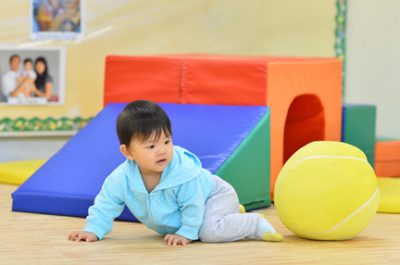Benefits of EXERCISE for Infants and Toddlers
“Brain research informs us that there are significant benefits from movement and brain development. While some studies indicate that regular exercise stimulates the brain and enhances cognitive function, other studies show that play is an essential part of human development.” – Mr Heng Swee Keat, Minister for Education.
Did you know that the hands-and-knees crawl by a child helps strengthen the upper body muscles and stimulate neurons important for cognitive processes such as comprehension, concentration and memory? Crawling is also a cross lateral movement that strengthens both the left and right side of the brain, allowing increased communication between the two sides of the brain and enhancing learning.

Why is exercise important for infants and toddlers?
While babies and older infants tend to turn, roll, crawl, climb and walk, the benefits of intentional child-directed activities and exercises can promote brain-muscle connections. Kinderland introduced enjoyable exercises for the infants and toddlers, created by Dr. Akira Maehashi from Waseda University, Japan. Exercises can be full of fun for the young infants and a great way for children to bond with parents and adults. For instance, mobile infants learning to crawl can go under a ‘bridge’ formed by a parent while singing “London Bridge”. A slide can easily be created by mummy’s pair of legs. Rolling and picking a ball are enjoyable exercises which also teach social, communicative and consequential skills.

Tummy time is encouraged for strengthening upper body and arm muscles, while balancing exercises develop stronger leg muscles. Well-designed cruiser boxes and wall bars help young infants to learn how to walk and climbing structures of differing heights inspire children to discover their physical strengths and abilities. Indoor and outdoor large-motor areas allow infants to exercise while making sense of the world around them. Kinderland instils the importance of daily movement and a healthy lifestyle early in the lives of our young infants.


